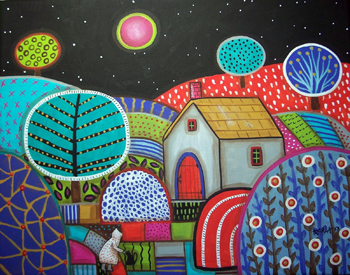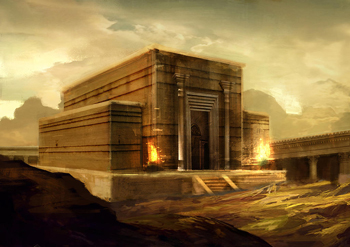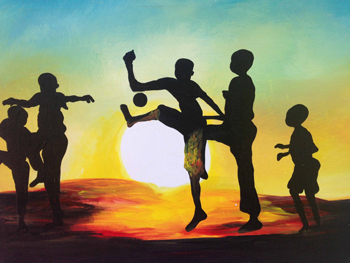For Sunday August 22, 2021
Lectionary Readings (Revised Common Lectionary, Year B)
1 Kings 8:22-30, 41-43
Psalm 84
Ephesians 6:10-20
John 6:56-69
NOTE: Our lectionary essay this week is written by Michael Fitzpatrick. Debie is on vacation, and will return on August 22nd.
I’ve had the privilege of traveling the full circumference of the globe, making my bed in many places and experiencing a wide diversity of cultural communities. Yet my childhood home remains one of my favorite places to just be. Certainly this reflects the love I have for my parents, but a home is more than simply being with loved ones or living within a shelter we have a right to occupy. Call the first “family of origin” and the second a “residence”. Home is something well beyond both of these, as my dear wife has taught me through our years of marriage. Home is an interweaving of comfort and familiarity, crafting a space where we feel a sense of belonging. It is a location of safety and nourishment, a place where we can rest when weary or find respite from suffering; where we can retire to good food and a warm bed. It is a place in which we can love and be loved in all our fragility and vulnerabilities.
Many people do not presently have a home, and some have never experienced a home. For some their family of origin was abusive or hurtful. Others have only known the exposure and instability of homelessness, never possessing a residence to call their own. The experience of my blessings growing up in a house so full of joy and freedom makes my heart ache to have everyone discover a home.
 |
|
Coming Home by Karla Gerard.
|
My hometown is along the Klamath River in northern California. I’ve written in the 8th Day column about some of the history of the area. Seiad Valley, where I grew up, is a former logging town with fewer than 300 people. Since the decline of the logging industry, the town has barely changed. It’s a place where no one is remotely wealthy, yet few live in fear since we all know each other and most people are peaceful folk. When I completed my term of service for the U. S. Army, I was exhausted and mentally broken from 27 months of combat duty in Iraq. My singular focus was getting off that airplane, hugging my family, and going home. I didn’t take up a job right away, nor did I go straight to school. I spent the next several months simply healing, and being, and learning to be a human again. Often when we hear of war veterans who have trouble integrating back into society after deployments, it’s because they found more of a home amongst their unit in a war zone than they do stateside. Home is indispensable to wholeness and flourishing.
Our Old Testament reading for this Sunday is the story of King Solomon’s dedication of the temple to the most high God. It’s a magisterial story of testament and gratitude to the Father in heaven who desires to be with his people. Solomon’s central theme lies in his question, “But will God indeed dwell on the earth?” In this context, ‘to dwell’ means to make a home. Solomon is asking how God can make a home with them in this temple. ´Tis a fair question, since “even heaven and the highest heaven cannot contain you, much less this house that I have built!” Yet the people of Israel built the temple anyway, not because they thought they could contain God, but because they dared to trust God’s covenant promise that the Divine One would come live amongst them.
“There is no God like you in heaven above or on earth beneath, keeping covenant and steadfast love for your servants who walk before you with all their heart,” Solomon says. This temple is home because it is the place where every stone and gold furnishing represents God’s faithfulness to the Lord’s own people. Solomon remembers the concrete, lived history of his forebears experiencing repeated acts of salvation at the Lord’s hand. Solomon declares the temple a place where God hears the cries of the people, heeds, and forgives. The temple is to be a place of belonging, not only for the covenant people who have experienced the faithfulness of God, but for anyone to come and discover for themselves the heavenly love. The foreigner is welcome in this place, because this temple is where anyone can come and pray, and be heard by the God who makes an abode in our midst.
 |
|
Solomon's Temple by Darius Czuja.
|
Today we live nearly two thousand years after the final destruction of the Jerusalem temple (and not even the one Solomon built). We typically worship the living God in parish buildings, though some church communities are not so fortunate and have to rent out secular spaces. Since the worldwide pandemic began in 2020, many of us no longer experience church through a geographical location, instead streaming church via Zoom or YouTube. Fellow parishioners sometimes remind me that God is omnipresent, everywhere, and so we don’t need to go anywhere to find God. This is a truth essential to the practice of daily prayer and life with God, yet I can’t help but feel that comments like these are akin to saying God can’t be contained in anything built by human hands or even in the highest heavens. The Jews knew this, and still God wanted them to build a temple.
For me, it’s a bit like going home to visit my parents. I can meet my parents anywhere in the world. They’re a couple of delightful retirees who are always up for an adventure. In 2018, I joined my wife and my parents for a trip to the Scandinavian countryside, touring through Norway, Sweden, and the Netherlands. As much fun as those adventures are, there is simply no replacement for seeing my parents at our family home. Because that is where our covenant love for each other resides, where my family and even a stranger are welcome to eat, sleep, laugh, and pray.
The Psalmist talks about how when they stand at “the threshold of the house of my God,” they experience God as both “sun and shield.” I’d be curious to know how others hear these verses; for me, the sun represents nourishment and warmth, while the shield embodies shelter, protection, and safety. I find all these things when I go home to visit my parents. Do we experience God like that? Have we opened ourselves to the Holy One who turns desolate valleys into overflowing springs with pools of water? Are we bold enough to build a house of worship with the conviction that “my King and my God” will come to live with us and give us a home? “How dear to me is your dwelling, O Lord of hosts!” the Psalmist exclaims. Would that we make these words our own and cherish the Lord’s dwelling with us!
 |
|
African Kids Playing by Davis Muwumba, Uganda.
|
Of course, a remarkable change occurs between the Old and New Testaments. God takes up dwelling once more amongst the people, but this time not in a place, but a person. When Jesus asks St. Peter, “Do you wish to go away?”, St. Peter’s reply is not, “Where would we go?”; rather he says, “Lord, to whom can we go?” In the Old Testament the people depended on tabernacles and temples and synagogues to be in the dwelling of the Lord. With the incarnation of the Son of God, the home of God has translated from temple walls into the One who brings the words of eternal life. When we unite ourselves with Christ, we come into God’s home, and God dwells with us and in us. The need for physical spaces to dwell with our Creator is not diminished, but the Body of Christ will always be the primary place we abide with the Lord.
It’s my prayer this week that we might meditate on how the words of Solomon and the Psalmist in the Old Testament can become our words as we describe our faith and walk with the Risen Christ. “Happy are they who dwell in your house! They will always be praising you!” (Psalm 84.3). If we feel unmoored, vulnerable, lacking shelter, craving belonging, or in need of nourishment, perhaps it’s because we’ve been out in the spiritual cold for a bit, and it’s time to come home to the temple of the Lord.
Michael Fitzpatrick welcomes comments and questions via m.c.fitzpatrick@outlook.com
Image credits: (1) Blogspot.com; (2) Tinyurl.com; and (3) Pinimg.com.





